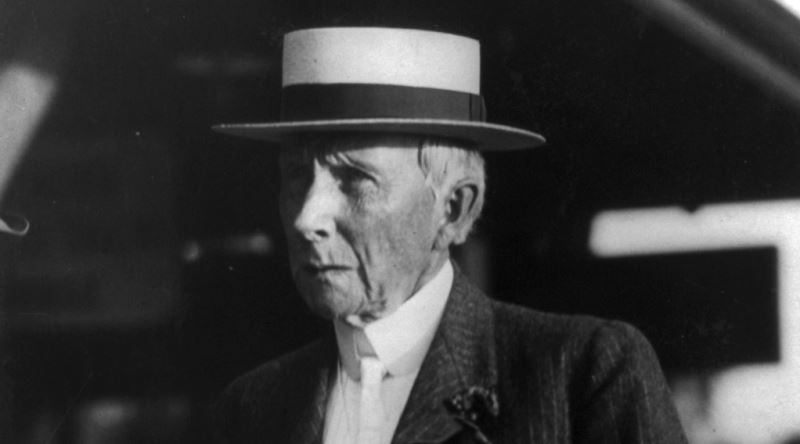John Davison Rockefeller, a name synonymous with immense wealth and the oil industry, rose from modest origins to become one of the richest men in history. His story is a complex tapestry woven with ambition, innovation, ruthless business tactics, and calculated philanthropy. This article delves into Rockefeller’s journey, exploring his early life, the rise of Standard Oil, the controversies surrounding his business practices, and his eventual transformation into a major philanthropist.
A Seed of Ambition Planted in Upstate New York
John D. Rockefeller was born in 1839 in Richford, New York, into a large family. His father, William Avery Rockefeller, was a traveling salesman with a reputation for inconsistency. His mother, Eliza Davison Rockefeller, instilled in John the values of hard work, thrift, and religious devotion – principles that would profoundly impact his future endeavors.
Despite facing financial struggles throughout his childhood, young John displayed a keen eye for business. He saved money from odd jobs and even started raising turkeys, demonstrating an early aptitude for turning a profit. This spirit of entrepreneurship would become a defining characteristic throughout his life.
A Career Path Forged in Oil
In 1853, the Rockefeller family relocated to Cleveland, Ohio, a burgeoning center of the oil industry. The discovery of vast oil reserves in Pennsylvania had ignited a national gold rush, and Rockefeller, at the age of 16, saw an opportunity. He landed a job as an assistant bookkeeper at a commission firm dealing in various commodities, including oil.
Rockefeller quickly grasped the potential of the oil industry. In 1863, with a $1,000 loan from his father, he partnered with Maurice B. Clark to form a crude oil refinery. This marked the beginning of Rockefeller’s journey towards amassing an oil empire.
The Rise of Standard Oil: Innovation and Ruthlessness
Rockefeller’s strategic brilliance became evident early on. He recognized the need for efficiency and consolidation within the fragmented oil refining industry. He reinvested profits back into the business, establishing new refineries and acquiring existing ones. Standard Oil, which he co-founded in 1870, became his primary vehicle for achieving dominance.
Rockefeller’s business strategies were not without controversy. He employed ruthless tactics like predatory pricing and secret rebates from railroads to undercut competitors and drive them out of business. Standard Oil secured exclusive deals with railway companies, allowing them to transport oil at significantly lower rates than their competitors. These practices earned Standard Oil a reputation as a monopoly, and Rockefeller himself became a symbol of ruthless capitalism.
However, Rockefeller was not solely focused on eliminating competition. He also pioneered innovative refining techniques that reduced waste and increased efficiency. Standard Oil became a model of vertical integration, controlling every aspect of the oil production process, from extraction to transportation and refining. These innovations, combined with his aggressive business tactics, solidified Standard Oil’s position as the dominant force in the American oil industry.
A Legacy of Wealth and Controversy
By the early 1880s, Standard Oil controlled a staggering 90% of U.S. refineries. This level of dominance attracted significant public scrutiny and legal challenges. In 1911, the Supreme Court ruled that Standard Oil constituted an illegal monopoly, forcing its break-up into smaller companies.
Despite the dismantling of Standard Oil, Rockefeller’s wealth remained immense. His fortune, estimated at over $300 billion in today’s dollars, made him the richest American of all time. However, his legacy remains a subject of debate. He is lauded by some for his entrepreneurial spirit, innovation, and philanthropic contributions later in life. Others criticize his ruthless business practices and the monopolistic power he wielded.
From Oil Baron to Philanthropist: A Transformation
In his later years, Rockefeller shifted his focus from accumulating wealth to philanthropy. He established the Rockefeller Foundation in 1913, which remains one of the world’s largest philanthropic organizations today. The foundation has made significant contributions to public health, education, and scientific research. Rockefeller’s other philanthropic endeavors include funding the University of Chicago and Spelman College, a historically black college in Atlanta.
The Rockefeller Legacy: Beyond Oil
The Rockefeller family’s influence extends far beyond the oil industry. John D. Rockefeller’s descendants have become prominent figures in various fields, including philanthropy, politics, and the arts. The Rockefeller Foundation continues to be a major force in global philanthropy, and institutions like the Museum of Modern Art in New York City stand as testaments to the family’s artistic patronage.
A Man of Contradictions
John D. Rockefeller remains a complex and controversial figure. He was an embodiment of the American dream, rising from humble beginnings to achieve unimaginable wealth. His business acumen and innovation transformed the oil industry, and his later-life philanthropy addressed critical social issues. However, his ruthless business practices and the monopolistic power he wielded cast a shadow on his legacy.
A Legacy that Endures
Rockefeller’s story continues to resonate in the modern business world. His strategies of vertical integration, efficiency, and reinvestment of profits remain core principles for many successful companies. However, the ethical considerations surrounding his monopolistic practices and ruthless tactics serve as a cautionary tale.
Conclusion: A Complex Legacy with Lasting Impact
John D. Rockefeller’s life and career offer valuable lessons that continue to be relevant today. It highlights the power of ambition, innovation, and calculated risk-taking. It also raises crucial questions about the ethical implications of business practices and the potential societal impact of concentrated wealth. By understanding the complexities of Rockefeller’s life and career, we can gain valuable insights into the history of American business, philanthropy, and the enduring pursuit of wealth and power.
